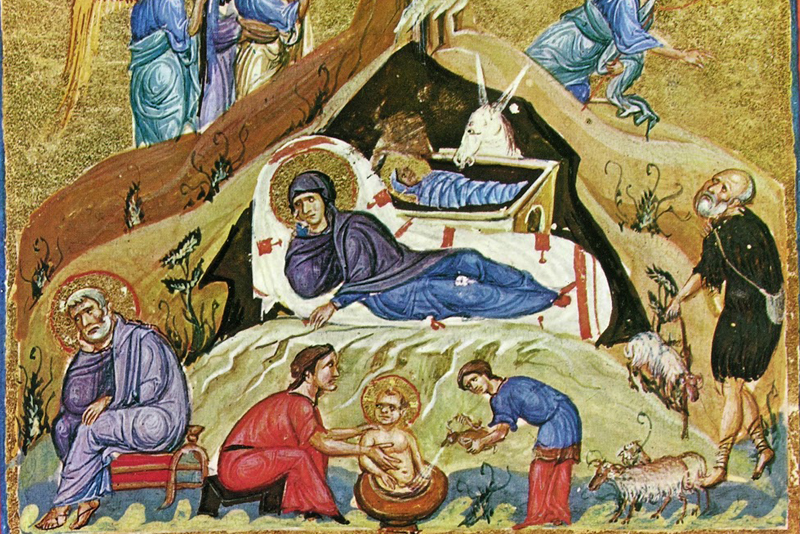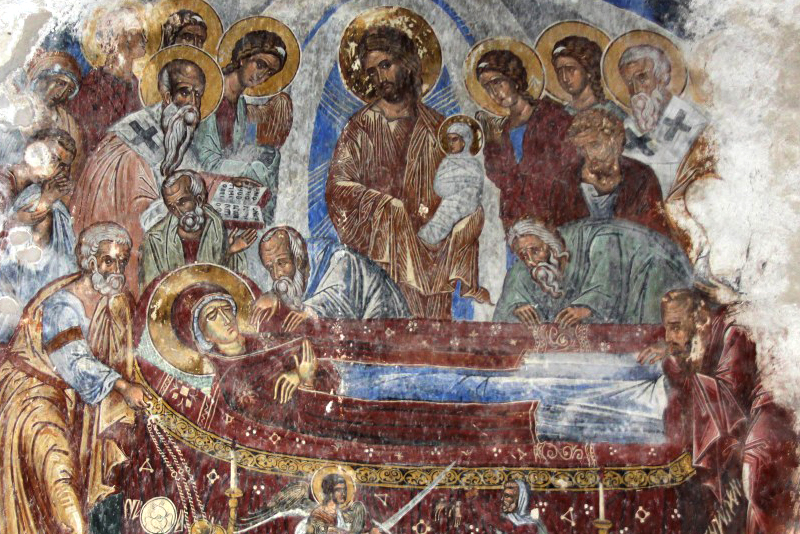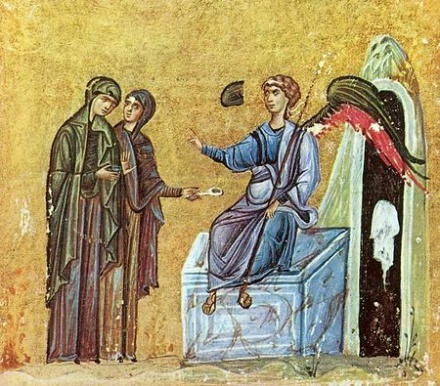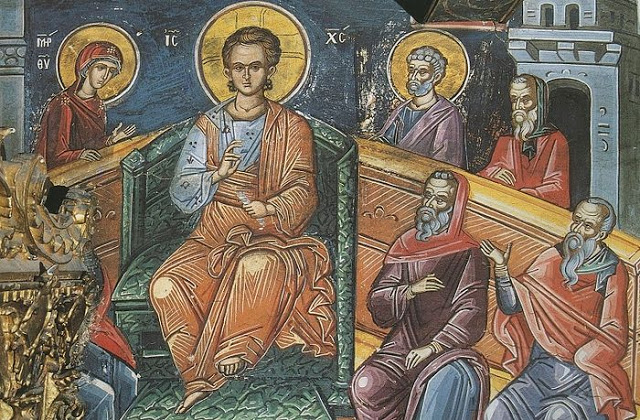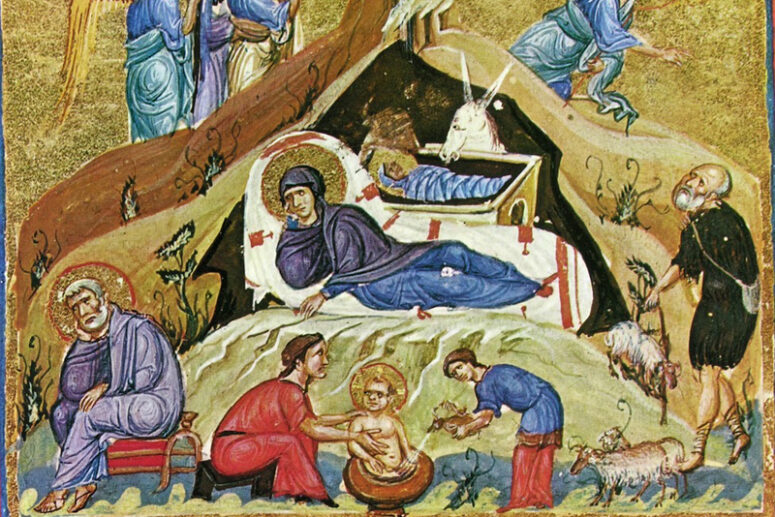
Christ is born! Glorify him!
Christ did not arrive “out of the clear blue”, without warning. There had been long centuries of preparation – indeed from before the beginning of time.
Saint Paul wrote that Christ came in “the fullness of time” Galatians 4:4 – that is, at the right time, when all things were ready. The Jews were a people prepared who knew God and his character, so a few of them at least could recognize him for Who he is. The time was right in that the ancient Mediterranean world was prepared, at peace (Pax Romana) so the Apostles could quickly spread the Good News, and with common languages (Greek and Latin) so the Gospel could be understood.
Thy Nativity, O Christ our God, has shown to the world the Light of Wisdom, for by it those who worshiped the stars were shown by a star to worship thee, O Sun of Righteousness, and to know thee the daystar from on high: Glory to thee, O Lord!
There was well-developed Greek philosophy and terminology so, in due time, the Gospel could be expressed in away that could be universally grasped. (Though we to the West often neglect the fact that Apostles also spread the Faith to the East.) The old gods were fading, leaving great spiritual hunger so that people were eager for the Good News. It was the right time.
And so he came.
As I read the New Testament I am always startled by the confidence of the writers. Looking back after 2000 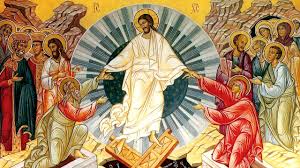 years of Christian history, it’s easy for us to miss the fact that the life of Christ was an event which at the time meant almost nothing in the eyes of the world. It took place in a small country in the corner of the Empire. Hardly anyone of significance had even heard of it. Yet the Evangelists and Apostles had no doubt that something earth-shaking had happened during this one Man’s few years on earth, which had absolute cosmic and eternal significance. (Perhaps this will give us more confidence in this age when Christianity, at least in our culture, feels shaky.) Let’s look at it.
years of Christian history, it’s easy for us to miss the fact that the life of Christ was an event which at the time meant almost nothing in the eyes of the world. It took place in a small country in the corner of the Empire. Hardly anyone of significance had even heard of it. Yet the Evangelists and Apostles had no doubt that something earth-shaking had happened during this one Man’s few years on earth, which had absolute cosmic and eternal significance. (Perhaps this will give us more confidence in this age when Christianity, at least in our culture, feels shaky.) Let’s look at it.
In what follows, we’ll not tell his story. We’ll talk about its meaning.
Who was (is!) Jesus of Nazareth?
One who was infinitely more than anyone had been expecting. From the beginning Christians have said that Jesus is more than just a man. Early on, they had a lot of trouble getting this into words. Later their language became more clear, as they tried to express how this man Jesus of Nazareth is also in some almost unfathomable way the one God made flesh.
This means that all history now focuses on this God Man, for if he is God, then on him hangs everything in heaven and on earth and “under’ the earth. The Gospels tell how the Apostles came to believe this unbelievable thing. The doctrine of the Incarnation tries to describe this indescribable Man. The Creed and the doctrine of the Holy Trinity try to express how this impossible thing could be possible: He is the “Son of God, the only-begotten, begotten of the Father before all worlds, Light of Light, Very God of Very God, begotten, not made; of one essence with the Father, by whom all things were made.”
But, as Saint John of Damascus wrote, we believe Jesus is begotten of the Father because he said so, but what it means we have no idea! No words can do him justice. They only point towards the Mystery. Jesus Christ is always 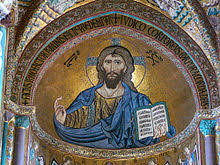 beyond us, a Mystery hidden not in darkness but in light. He is too bright, too glorious for us to see him directly as he is. This is why we came to celebrate his coming at the winter solstice, for Christ is like the sun, which we cannot look at straight on but without whom we die, and in whose light we live and see to walk safely. That is Our Lord and God and Savior Jesus Christ.
beyond us, a Mystery hidden not in darkness but in light. He is too bright, too glorious for us to see him directly as he is. This is why we came to celebrate his coming at the winter solstice, for Christ is like the sun, which we cannot look at straight on but without whom we die, and in whose light we live and see to walk safely. That is Our Lord and God and Savior Jesus Christ.
How Christ redeemed us
What follows here is only a minute utterly inadequate part of the explanation. Millions of words have been written about this.
We said last week that mankind’s biggest problem is death. (We sin, fall away from God and right living, chiefly because we don’t enough time, and we panic. Think about it.) How did Christ solve the problem of sin and death? By dying. (Read Saint Athanasios: On the Incarnation.) He entered into death, conquered it from the inside. He went into hell (sheol, hades, the place of departed spirits, the shadowy land of destruction, “the land of silence” or as one translation puts it “the land where all things are forgotten” Psalm 115:17, and destroyed the devil’s dark kingdom, broke down its gates and bars for us, so that it no longer held us captive – and rose victorious, leading the dead, leading us up out of captivity and with him into Glory. “Today Hades groans, crying, ‘My power has been destroyed, because I received a dead Man as one of the dead, but could not hold Him. Instead, I lost with Him those who were under my reign. From ancient times I have held control over the dead. But this One raised them all.’ Therefore, glory to Thy Crucifixion and to Thy Resurrection, O Lord.” Holy Saturday sticheron. 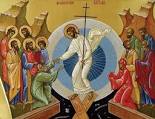 Thus he redeemed death itself, changing it from the gate to our destruction into our entrance into his eternal Kingdom. We Orthodox sing it over and over during the forty days of Pascha: “Christ is risen from the dead, trampling down death by death, and upon those in the tombs bestowing life.”
Thus he redeemed death itself, changing it from the gate to our destruction into our entrance into his eternal Kingdom. We Orthodox sing it over and over during the forty days of Pascha: “Christ is risen from the dead, trampling down death by death, and upon those in the tombs bestowing life.”
There is also Saint Paul’s understanding of how we are redeemed: Christ came to incorporate us into his Body which has already died and has risen again. As members of his Body, which is the Church, we live already on the other side of death. We see Christ not only as a Man but as a “corporate Person” which includes all of us. This is almost beyond comprehension to our modern individualistic mindset. Including my own, I fear, but there it is. See Colossians 3:1-3 and many others passages.
And there are more understandings of salvation. Jesus Christ is like a precious jewel of which we, both corporately and individually, are forever seeing new gleaming facets.
I have not mentioned the belief dominant in Western Christianity that Christ somehow “paid the price” to God the Father, so God would no longer have send us to hell. This is because this is a later legalistic doctrine of redemption which is barely Scriptural, if it all. Or at least in Orthodox and Patristic writing it is a very minor sub-theme.
The Eternal Wedding Banquet
But here’s the strange thing: Christ appeared as predicted by the prophets, and the Jews did not believe in their Messiah. A few did – Mary and Joseph, John the Baptist, the disciples, 3000 on Pentecost – but the vast majority did not. Jesus knew it was coming, but it broke his heart: “Jerusalem, Jerusalem…, how often I have longed to gather your children together, as a hen gathers her chicks under her wings, and you would not.” Matthew 23:37
Here is one way Jesus taught about this: In the parable in Luke 14, God in Christ invited his people to a banquet. (In Matthew 22, it’s a wedding banquet.) A feast of Faith in one God who rules all things, so we can unify, integrate our whole lives in him. A feast of Hope: “he who lives and believes in me will not die but have eternal life.” A feast 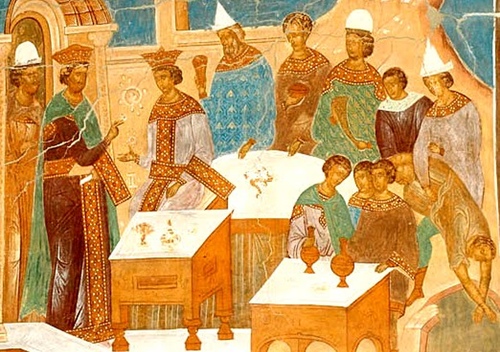 of Love: despite appearances oftentimes, we see that God loves us so much that he gave his only begotten Son. We feast on Christ himself. The Divine Liturgy is a foretaste, a beginning of the great banquet to come where already we are swept up into Christ’s Kingdom, and we feed on his Body given for us, his Blood shed for us, his very Presence.
of Love: despite appearances oftentimes, we see that God loves us so much that he gave his only begotten Son. We feast on Christ himself. The Divine Liturgy is a foretaste, a beginning of the great banquet to come where already we are swept up into Christ’s Kingdom, and we feed on his Body given for us, his Blood shed for us, his very Presence.
But in the parable the Jews would not come to the their own Messiah’s feast. Christ condemned their blind leaders for this. (And in one way we can understand. Even to those who knew the Scriptures well, many of the prophecies were obscure. After his resurrection, Christ had to explain to the Apostles exactly how they referred to him. And Jesus seemed to have more patience with ordinary peoples’ excuses: “Sorry, too busy with this and that. Surely you can understand…” (Do we sometimes have the same excuses?) Nevertheless most of the Jews, his own people, missed the banquet.
So in the parable he sent his servants out to invite “the poor, the maimed, the lame, the blind”, and the down-and-outs did come to Christ – sinners, crooked tax collectors, prostitutes, Samaritans (people whom everybody despised), the sick. And then he sent his Apostles out into the world to invite those “in the highways and hedges”, the Gentiles (whom also Jews despised) – and they came, we came, those of us whose ancestors were not Jews. And so from the beginning, as Paul wrote, the Church of Christ has been composed of peoples of all sorts: “Greeks and Jews, slaves, freemen, barbarians, Scythians Colossians 3:11 (whom everyone despised) – and now Russians, Syrians, Filipinos, Americans, Mexicans and Central Americans (whom some now despise, despite the fact that the majority of them are Christians!) – all peoples united in Christ.
And so now through the Church (and it should be added, also through our Christin sub-sects and through Islam, which according to Saint John of Damascus is only a Christian heresy) Abraham has truly become father of a multitude of nations, all worshiping and following the God of the Jews. The promises to the forefathers, to Abraham and the prophets, have been fulfilled in Jesus Christ. How tragic the most Jews, God’s first Chosen People, are missing it. I wonder: If Christians had treated the Jews better instead of branding them all as Christ-killers and persecuting them, would they by now have come to faith? How different would the world, the Middle East, be today if they had.
The Renewal of the World
In Christ the Creator of mankind came to renew us defaced icons, re-create us i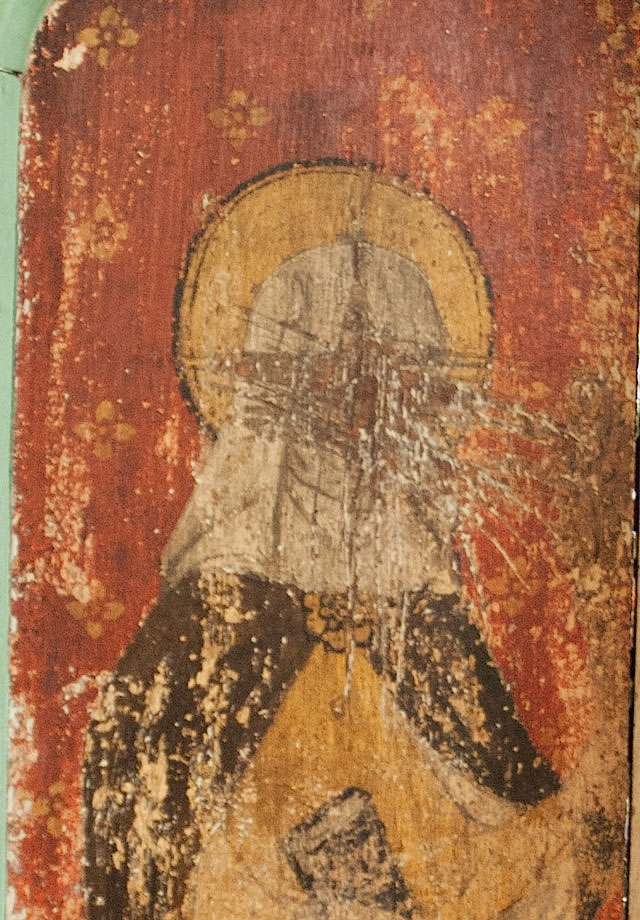 n his own image, make us good and beautiful in him again, as we were at the beginning. Christ came to clean us up, remove from
n his own image, make us good and beautiful in him again, as we were at the beginning. Christ came to clean us up, remove from ![]() us dirty icons the covering of sin, the stain of “anger, wrath, malice, blasphemy, filthy talk, lying, fornication, uncleanness, passion, evil desire, greed”. Colossians 3:5
us dirty icons the covering of sin, the stain of “anger, wrath, malice, blasphemy, filthy talk, lying, fornication, uncleanness, passion, evil desire, greed”. Colossians 3:5
Or to use another figure, Christ came to guide us back from our detour and on the road to goodness again, headed in the right direction, lead us up out of the darkness into the light, away from death into life. And by his life, death and resurrection he is doing it.
And that is what the rest of history is all about. History still has its ups and downs, God knows, but where it’s headed is now clear. All things are being made new in Christ, united with him forever and restored to their original beauty. And far more: it is as if we icons were being made three-dimensional and alive! Despite all the horror and the glory of history, this is where it’s all headed.
Everything else consists of details.
And so on to beyond the End.
Here is how “post-history” is described at the end of the last book of the Bible: “I saw the Holy City, the new Jerusalem, coming down out of heaven from God, prepared as a bride beautifully dressed for her husband. And I heard a loud voice from the throne saying, ‘Behold! God’s dwelling place is now among his people, and he will dwell with them. They will be his people and God himself will be with them and be their God. He will wipe every tear from their eyes. There will be no more death or mourning or crying or pain, for the old order has passed away.’ He who was seated on the throne said, ‘Behold, I make all things new!’” Revelation 3:5
And Christ will be all in all in his Kingdom which will have no end.
Please, Lord, soon.
How we potential Gods and Goddesses fit into the Story.
God has created us and has given you and me, each of us, our place in history. We live once here un earth. That’s it. We have one opportunity. Popular modern mythology says then “we all die and go to a better place”. The truth is “we all die”. Whether we go to a better place is up to us. If we choose to waste our lives on the things Paul mentioned, on “stuff” that isn’t worth saving, then at the end of history, the Last Judgment, the final housecleaning, God will decide we are not worth saving, or else he will save us. That is the obvious meaning of being “saved”. Please disavow yourself of another modern myth that being “saved” is a momentary experience. Rather it’s exactly what it sounds like: it means that at the End God doesn’t throw us out because we’ve become worthless junk, but rather that God keeps us in his House, saves us.
And then, to change images, in that Land we will at last be free and the devil will no longer come at us, and God will give us everlasting life – all the time we need to keep growing into the fullness of Salvation – life and love and knowledge and joy – until we finally become the people he created us to be.
If we will have it, if we choose to have him, if we will walk with him and let him lead us into the light. C.S. Lewis wrote in The Great Divorce that in the End there will be only two kinds of people: those who have said “Thy will be done”, and those who have said “My will be done”. And God, respecting the free will he has given us, will give to both sorts that which they have chosen. Lewis wrote elsewhere that someday those who choose correctly will stand before each other in such Glory that, if we were to see each other like that now, we would be tempted to fall down in worship. Or if we choose wrong, we will be like demons from hell.
And then at the End, beyond the End we will walk with him into the Glory, to that great Banquet in his eternal Kingdom “where the voice of those the feast is never silent, and the delight of those that behold the inexpressible beauty of thy countenance passes all telling”. A Prayer of Sant Basil the Great.
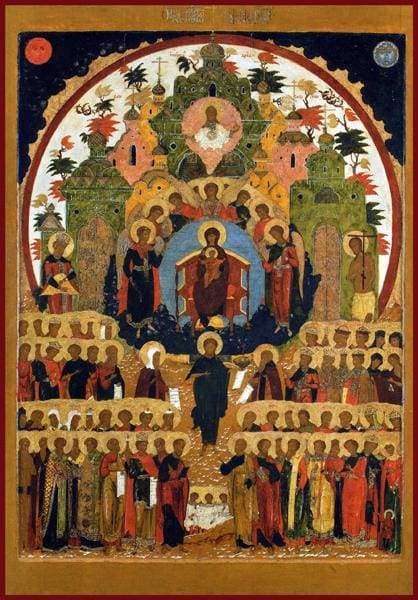
And in some way which we cannot yet comprehend, all of Creation will also be changed, renewed, glorified, saved. We will be forever with him and with all who have loved him and whom we have loved. And that will be the Beginning beyond the End of Everything.
If we will have it…
Brothers and sisters, keep your eyes on the prize. We haven’t achieved it yet. We’re not there yet. But we have been invited. From the book of Revelation 19:9 again: “Blessed are those who are invited to the Wedding Banquet of the Lamb.” And one of those whom he has invited is you.

